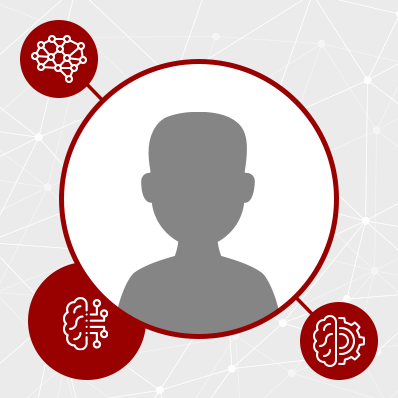McKemy, David
Professor of Biological Sciences
The McKemy laboratory studies the neurobiological basis of pain, focusing on general somatic sensations of pain, painful neuropathies associated with chronic injury and disease, and the mechanisms that lead to migraine headaches. The lab is also interested in how the microbiome alters general physiological functions that can lead to pain and other disorders.
Moore, Jeffrey
Assistant Professor of Biological Sciences
Many mammals sense and affect their environment predominantly through innate motor programs for exploration, social interaction, and ingestion; yet, little is known about the neuronal circuits that control these motor programs. Our lab uses molecular, systems, and computational neurobiological techniques to identify specific brainstem motor control modules and to determine how higher-order brain structures engage these modules for innate behaviors.
Tabbaa, Manal
Research in the Tabbaa lab leverages genetically diverse mouse genetic reference panels to model individual differences in complex behaviors and susceptibility to a high-confidence autism risk gene. The goal of these projects is to better model genetically diverse populations in mice in order to address the challenging issue of developmental heterogeneity and genetic risk factor susceptibility in human neurodevelopmental disorders.
Thompson, Paul
Paul Thompson is a Professor in the Keck School of Medicine of USC. His team’s research projects focus on the neuroscience, mathematics, computer science, software engineering and clinical aspects of neuroimaging and brain mapping. Honored with the 2023 Pioneer in Medicine Award of the Society of Brain Mapping and Therapeutics, and the U.S. Alzheimer Association’s Zenith Award, Paul Thompson directs the ENIGMA Consortium, a global alliance of 2500 scientists in 47 countries who conduct the largest studies of 30 major brain diseases – ranging from Parkinson’s disease, anorexia, schizophrenia, depression, ADHD, bipolar illness and OCD, to HIV and addictions and their effects in the brain. ENIGMA’s genomic screens of over 70,000 people’s brain scans and genome-wide data (published in Nature Genetics, 2012; Nature, 2015; Science, 2020) have brought together experts from 300 institutions to unearth over 500 genetic variants that affect brain structure, disease risk, and brain connectivity. At USC, Dr. Thompson is a Professor of Neurology, Psychiatry, Radiology, Pediatrics, Engineering, and Ophthalmology, and Director of the ENIGMA Center for Worldwide Medicine, Imaging & Genomics – a $11M NIH Center of Excellence in Big Data Computing. Using worldwide medication screens, ENIGMA discovers factors that affect progression of Alzheimer’s disease and other dementias, schizophrenia, depression and childhood brain disorders. Dr. Thompson also directs AI4AD – an $18M NIH Initiative on AI methods to accelerate Alzheimer’s disease research, discovering novel treatment targets; he directs the India ENIGMA Initiative – large-scale study of brain aging in India. He directs the USC Imaging Genetics Center – a group of 50 scientists in Marina del Rey. His team created the first maps of Alzheimer’s disease and schizophrenia spreading in the living brain, and a method to track brain growth in children. Dr. Thompson has an M.A. in mathematics and Greek and Latin Languages from Oxford University, and a PhD in neuroscience from UCLA.
Watts, Alan
Professor of Biological Sciences
My work focuses on understanding how the brain contributes to the development, manifestation, and complications of diabetes and obesity, primarily on how this happens at the neural network level. In particular, I am interested in how interoceptive and exteroceptive signals interact with the brain to control endocrine and behavioral responses to energy deficits. Currently I am using neuroinformatic methods to explore how the rat brain connectome can reveal the organization of the control networks that influence the behavioral, endocrine, and autonomic motor events associated with metabolic physiology and its dysfunction.
Wood, Ruth
Professor of Integrative Anatomical Sciences
My research uses rodent models to study behavioral neuroendocrinology, how hormones act in the brain during development and in adulthood to control behavior in males and females. My emphasis is on hormonal control of cognition, cooperative behavior, and reward. Current research addresses how oxytocin promotes cooperation, and how anabolic steroid abuse impairs cognition.







